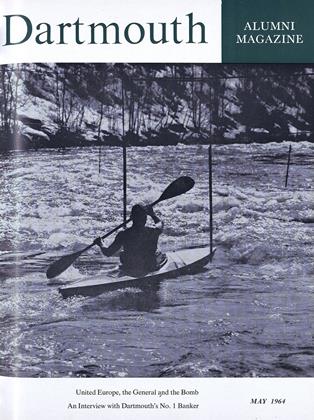Edited, with an introduction, byJames E. Wellington '48. Coral Gables:University of Miami Press, 1963. 178 pp.$2.00.
Year afterYear after year poetry-loving Dartmouth undergraduates voted Robert Frost as their favorite poet. More recently an esoteric elite have championed Donne and Eliot. Today with the increased popularity of the 18th Century fewer and fewer students smirk at the briefest two lines of doggerel ever written: "Pope/Nope." They exalt Pope as wittier even than the metaphysical poets including Donne, passionate and paradoxically perverse.
Professor Wellington in editing the MoralEssays calls attention to poems so brilliant that they are not dimmed even in the diamond glitter of The Rape of the Lock, the Gothic glare of Heloise and Abelard, the Barnum and Bailey spotlights on the high-diving-into-a-newer exhibition in Book II of The Dunciad, or the broken stained-glass illumination of the Essay on Man and the Daliesque half lights of the ending. The most obvious comparison with The Rape is Epistle to a Lady, the subject of which Pope with charming understatement announces to be the characters of women "... more inconsistent and incomprehensible than those of Men."
Accordingly we get feminine extravagances bordering on the sinister but made macabrely picturesque by the 18th-century love of painting and costume: Fannia, smirking on her effete husband and dressing up as a naked Leda with a lascivious swan; a beauty dressing up as an angel but with artful lubricity combining Magdalen with her loose hair and Cecilia with her sweet smiles; Sappho, glittering with diamonds, heavily perfumed, but, underneath, unwashed; Rufa the redhead, pretending mornings to study Locke and evenings seeking pickups in a park; Narcissa so vain that she would do anything to enhance her beauty with a face lotion except boil a baby to make it; Cloe, the perfect woman who has everything... "except a heart." Between women and men, according to Pope, exists this minute difference:
Men, some to Bus'ness, some to Pleasure take; But ev'ry Woman is at heart a Rake.
And woman is protean in her rakishness.
Pope is a difficult author to assess with consistency, authority, and finality, for he often is a series of self-designed labyrinths all furnished with breakable threads leaving explorer-scholars not knowing which way to turn. With savoir faire and waxed twine Professor Wellington in his 87-page introduction solves problems which baffle the inexpert.
Such questions and answers serve intellectually acute and inquiring minds at graduate-school and honors levels, but Professor Wellington takes good care of undergraduates and general readers with 43 pages of factual notes for 45 pages of poetry.
Professor of English
 View Full Issue
View Full Issue
More From This Issue
-
 Feature
FeatureUNITED EUROPE, THE GENERAL AND THE BOMB
May 1964 By HENRY W. EHRMANN, -
 Feature
FeatureDARTMOUTH'S NO. 1 BANKER
May 1964 By DERO A. SAUNDERS '35, -
 Feature
FeatureA New Strategy of Liberal Learning
May 1964 -
 Article
ArticleTHE UNDERGRADUATE CHAIR
May 1964 By DAVE BOLDT '63 -
 Class Notes
Class Notes1936
May 1964 By BARRY C. SULLIVAN, GILBERT BALKAM -
 Class Notes
Class Notes1922
May 1964 By LEONARD E. MORRISSEY, CARTER H. HOYT
JOHN HURD '21
-
 Books
BooksBOSWELL IN SEARCH OF A WIFE, 1766-1769. Edited
January 1957 By JOHN HURD '21 -
 Books
BooksALL THE BEST IN THE CARIBBEAN.
January 1960 By JOHN HURD '21 -
 Books
BooksENGINEERING: ITS ROLE AND FUNCTION IN HUMAN SOCIETY.
JUNE 1968 By JOHN HURD '21 -
 Books
BooksAN ESSENTIAL SHAKESPEARE: NINE PLAYS AND THE SONNETS.
OCTOBER 1972 By JOHN HURD '21 -
 Books
BooksFIELDS OF GRACE.
APRIL 1973 By JOHN HURD '21 -
 Books
BooksALL THE BEST IN MEXICO
December 1974 By JOHN HURD '21
Books
-
 Books
BooksThe April issue of the Current History
June 1931 -
 Books
BooksMr. Willard T. McLaughlin '25
November 1932 -
 Books
BooksThe New Reservation of Time
February 1917 By HENRY T. MOORE -
 Books
BooksLABOR'S SEARCH FOR MORE
May 1937 By Hugh L. Elbree -
 Books
BooksSKIING FUNDAMENTALS, EQUIPMENT, AND ADVANCED TECHNIQUE
February 1937 By Nathaniel L. Goodrich -
 Books
BooksUrban Romantics
April 1976 By NOEL PERRIN


